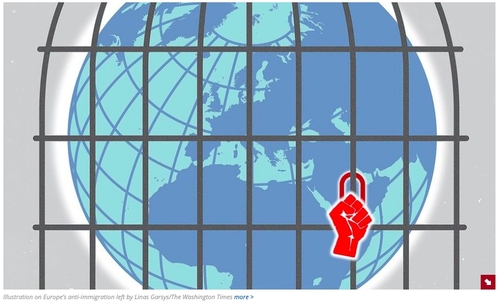With very few exceptions, liberals in the United States favor high levels of immigration; and the American Left goes further, calling to "Abolish ICE" (a reference to Immigration Customs and Enforcement, America's border security agency). But developments in Europe suggest this near-unanimity could one day shatter.
 Some American leftists demand "Abolish ICE! Open the borders!" |
Accordingly, the Left helped build the European Union and then pass the 1985 Schengen Agreement (that virtually eliminated internal borders among 26 European countries with a population of more than 400 million). It also enthusiastically welcomed non-Europeans, an approach that culminated in 2015-16 with Angela Merkel (a leftist in conservative disguise) taking in a million-plus migrants, mostly from the Middle East, who were met in Germany by a Willkommenskultur, or welcoming culture.
That massive influx, and especially the Islamists among them, stimulated a backlash among the Left's historic base, the workers, leading them to desert it in favor of once-marginal anti-immigration and anti-Islamization parties, the ones I call civilizationist. These parties, with their mix of generous social benefits and strong border controls, are gaining throughout Europe to the point that they wield real power in five governments (those of Poland, Czechia, Hungary, Austria, and Italy).
Getting elected, leftists increasingly realize, means making what Adler calls a "momentous turn" away from both the single European labor market and migration from outside Europe; this doublet, they recently discovered, "encourages exploitation, erodes community, and denies popular sovereignty." Left nationalists criticize the free movement of labor for several reasons: economic (jobs lost, wages undercut), cultural (loss of solidarity, xenophobia), and political (an elite project not endorsed by the masses).
In a startling turn-around, open borders are now seen as harming working-class interests while strict border controls assure workers' rights. The nation, long seen as a bourgeois project, has become a shield for workers against the perils of globalism. In this spirit, leading leftists in all three of Europe's largest, most influential countries call for limiting the free movement of labor:
 Jeremy Corbyn (R), Jean-Luc Mélenchon, Sahra Wagenknecht. |
France: Jean-Luc Mélenchon, leader of the La France Insoumise (France Unbound), a populist party, and the Left's outstanding figure, denounces seconded employees from other European Union countries as "stealing the bread" of French workers. He lauds the French flag and national anthem (rather than their socialist counterparts) as "revolutionary symbols," a dizzying shift.

Germany: Sahra Wagenknecht, co-leader of Die Linke (The Left) party, has spoken out against that welcoming of over a million migrants in 2015-16, against open borders, and against granting migrants unlimited access to work in Germany. She founded an organization (Aufstehen, or Stand Up) to forward these ideas and it has touched a nerve, with more than one out of three Germans potentially favoring its tough approach.
Of course, the nationalist version of socialism is hardly a novel idea but goes back to Benito Mussolini in Italy, who responded to the passions of World War I with an ideology he called fascism; more transparently, Adolf Hitler rode the National Socialist German Workers' Party, or Nazi party, to absolute power. Recalling those monsters, the current trend meets severe criticism; for example, Matt Qvortrup of Coventry University condemns Wagenknecht's fusion of anti-immigration policies with populist economics as "a dangerous mix."
 Mussolini (L) and Hitler. |
Adler notes that 40 percent of Democrats in the United States want yet higher levels of immigration than at present, in contrast to just 5 percent of Labour voters in the United Kingdom. Will losing voters cause the American Left also to learn the hard way and then catch up with its Old-World counterparts? It's just possible.
Mr. Pipes (DanielPipes.org, @DanielPipes) is president of the Middle East Forum. © 2019 by Daniel Pipes. All rights reserved.
The Washington Times graphic for this article.

May 11, 2019 update: David Adler did not discuss Denmark, so neither did I, but its Social Democratic party presents the starkest example of left-wing anti-immigration sentiments. Its leader, Mette Frederiksen, states that "For me, it is becoming increasingly clear that the price of unregulated globalisation, mass immigration and the free movement of labour is paid for by the lower classes." The Guardian further explains:
Under her leadership, the SD have called for a cap on "non-western immigrants", for asylum seekers to be expelled to a reception centre in North Africa, and for all immigrants to be forced to work 37 hours a week in exchange for benefits.
She has reached out to the populist Danish People's party (DPP), doing a series of joint interviews with its leader, Kristian Thulesen Dahl, and discussing cooperating with them in government.
But it is the government policies her party has supported or failed to oppose which have been most alarming for her allies in the left-of-centre red bloc. The Social Democrats voted in favour of a law allowing jewellery to be stripped from refugees, and a burqa and niqab ban, and abstained rather than voted against a law on mandatory handshakes irrespective of religious sentiment at citizenship ceremonies, and a plan to house criminal asylum seekers on an island used for researching contagious animal diseases. In February, she backed what the DPP has branded a "paradigm shift" – a push to make repatriation, rather than integration, the goal of asylum policy.
The shift appears to be paying dividends, with the party taking back voters from the civilizationist DPP. Elections on June 5 will verify or not the effectiveness of this tactic. If it works, it could be the start of something big.
June 4, 2019 update: Kristian Madsen, a political analyst for the newspaper Politiken, concurs with the last point: "What we're seeing is a laboratory for what the center-left [in Europe] can be."
June 6, 2019 update: Denmark's civilizationist party, the Danish People's Party, did terribly in yesterday's elections, with its vote going from 21.1 percent in 2015 to 8.7 per cent now, translating into a decline from 37 to 16 seats in parliament. But civilizationism did well, with the Social Democrats having adopted an anti-immigration policy, winning 48 seats, and heading a left-wing bloc of 91 seats.
Comments: (1) Fine with me, being pro-civilizationism, not pro-civilizationist parties. (2) Let's see if the Social Democrats can sustain their anti-immigration approach when working with its leftist allies. (3) Or will it ditch them in favor of working with other anti-immigration parties, implying that immigration and Islamization, not the economy, is the most important issue? Stay tuned.
June 14, 2019 update: Jamie Dettmer discusses the possible impact of the Danish election on other leftist parties at "Europe's Mainstream Left Debates Stricter Immigration Rules."
Jan. 23, 2021 update: Denmark accepted 1,547 asylum seekers in 2020, the fewest number since 1998 (the largest number was 21,316 in 2015), and Prime Minister Mette Frederiksen has now announced a startling goal for 2021: to admit zero asylum seekers.
Apr. 12, 2022 update: Michael Lind surveys the U.S. Left's immigration debate:
Up until around 2000, libertarians and employer-class Republicans wanted to weaken laws against illegal immigration and expand low-wage legal immigration, against the opposition of organized labor and many African-Americans—who for generations have tended to view immigrants as competitors. The Hesburgh Commission on immigration reform, appointed by President Jimmy Carter, and the Jordan Commission, appointed by President Bill Clinton and led by Texas Representative Barbara Jordan, the pioneering civil rights leader who was left-liberal, Black, and lesbian, both proposed cracking down on illegal immigration—by requiring a national ID card, punishing employers of illegal immigrants, and cutting back on low-skilled, low-wage legal immigrants. As late as 2006, then-Senators Barack Obama and Hillary Clinton both voted for 200 miles of border fencing in the Southwest.
Then, virtually overnight, the progressive movement flipped and adopted the former talking points of the Chamber of Commerce cheap-labor lobby. While Democratic politicians deny that they oppose enforcing immigration laws, center-left journals and journalists keep pushing the idea of open borders, in alliance with crackpot free market fundamentalists. On April 12, 2022, David Dayen in the American Prospect wrote that "declining immigration rates since the pandemic have contributed to labor shortages in key industries and harmed Americans who rely on those services." Dayen linked to an article in the libertarian Wall Street Journal bemoaning rising wages as a result of lower immigration. On February 20 of this year, The New Yorker published a long essay by Zoey Poll, "The Case for Open Borders," a fawning profile of the libertarian ideologue Bryan Caplan, author of Open Borders: The Science and Ethics of Immigration, which, appropriately, takes the form of a graphic novel—that is to say, a comic book.
Back in 2015, Ezra Klein, then editor of the "progressive" outlet Vox, asked Senator Bernie Sanders about the idea of "sharply raising the level of immigration we permit, even up to a level of open borders." Sanders replied in alarm: "Open borders? No, that's a Koch brothers proposal." The lobby FWD.us, funded by Facebook and other large tech corporations that prefer hiring indentured servants (H-1bs) bound to their employers instead of free American citizen-workers and legal immigrants, denounced Sanders for holding "the totally-debunked notion that immigrants coming to the U.S. are taking jobs and hurting Americans."
Vox then published an article by Dylan Matthews entitled "Bernie Sanders's fear of immigrant labor is ugly—and wrong-headed." "If I could add one amendment to the Constitution," Matthews declared, "it would be the one Wall Street Journal editorial page editor Robert Bartley once proposed: 'There shall be open borders.'" In 2018, the progressive author Angela Nagle was canceled by Progressivism, Inc. when she published an essay in American Affairs, "The Left Case Against Open Borders." By 2020, when Matthew Yglesias, a co-founder of Vox, published One Billion Americans, the purging of dissidents and the fusion of the Progressivism, Inc. party line on immigration with the anti-union, cheap labor policies favored by the Wall Street Journal and Silicon Valley was complete.
